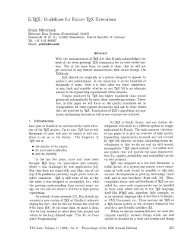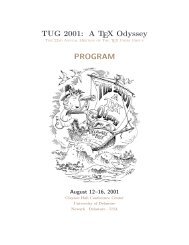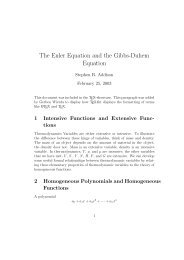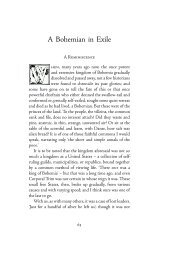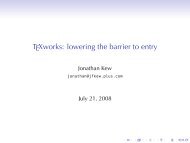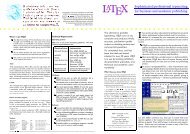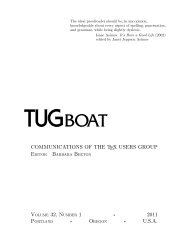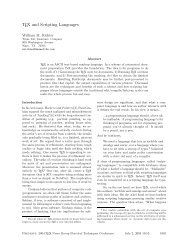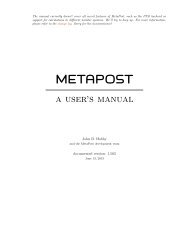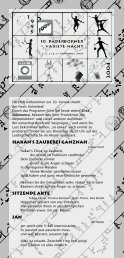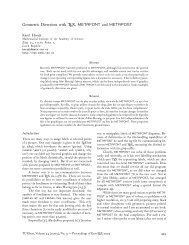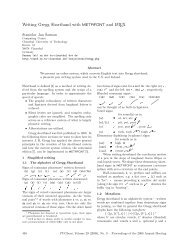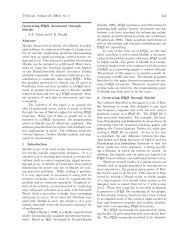The Communications of the TEX Users Group Volume 29 ... - TUG
The Communications of the TEX Users Group Volume 29 ... - TUG
The Communications of the TEX Users Group Volume 29 ... - TUG
You also want an ePaper? Increase the reach of your titles
YUMPU automatically turns print PDFs into web optimized ePapers that Google loves.
Hans Hagen<br />
local t, n = { }, 0<br />
for i = metapost.first_box, metapost.last_box<br />
do<br />
n = n + 1<br />
if tex.box[i] <strong>the</strong>n<br />
t[#t+1] = format(<br />
"_tt_w_[%i]:=%f;_tt_h_[%i]:=%f;_tt_d_[%i]:=%f;",<br />
n,tex.wd[i]/factor,<br />
n,tex.ht[i]/factor,<br />
n,tex.dp[i]/factor<br />
)<br />
else<br />
break<br />
end<br />
end<br />
return t<br />
end<br />
This is a typical example <strong>of</strong> accessing information<br />
available inside <strong>TEX</strong> from Lua, in this case information<br />
about boxes.<br />
<strong>The</strong> trial_run flag is used at <strong>the</strong> MetaPost<br />
end; in fact <strong>the</strong> textext macro looks as follows:<br />
vardef textext(expr str) =<br />
if _trial_run_ :<br />
% see first variant above<br />
else :<br />
% see second variant above<br />
fi<br />
enddef ;<br />
This trickery is not new. We have used it already<br />
in Con<strong>TEX</strong>t for some time, but until now <strong>the</strong><br />
multiple runs took way more time and from <strong>the</strong> perspective<br />
<strong>of</strong> <strong>the</strong> user this all looked much more complex.<br />
It may not be that obvious, but in <strong>the</strong> case <strong>of</strong><br />
a trial run (for instance when texts are found), after<br />
<strong>the</strong> first processing stage, and during <strong>the</strong> parsing <strong>of</strong><br />
<strong>the</strong> result, <strong>the</strong> commands that typeset <strong>the</strong> content<br />
will be printed to <strong>TEX</strong>. After processing, <strong>the</strong> command<br />
to do an extra pass is printed to <strong>TEX</strong> also. So,<br />
once control is passed back to <strong>TEX</strong>, at some point<br />
<strong>TEX</strong> itself will pass control back to Lua and do <strong>the</strong><br />
extra pass.<br />
<strong>The</strong> base function is called in:<br />
function metapost.graphic(mpsformat,str,<br />
preamble)<br />
local mpx = metapost.format(mpsformat<br />
or "metafun")<br />
metapost.graphic_base_pass(mpx,str,preamble)<br />
end<br />
<strong>The</strong> metapost.format function is part <strong>of</strong> <strong>the</strong><br />
mlib-run module. It loads <strong>the</strong> metafun format, possibly<br />
after (re)generating it.<br />
Now, admittedly all this looks a bit messy, but<br />
in pure <strong>TEX</strong> macros it would be even more so. Some-<br />
time in <strong>the</strong> future, <strong>the</strong> postponed calls to \ctxlua<br />
and <strong>the</strong> explicit \pdfliterals can and will be replaced<br />
by using direct node generation, but that requires<br />
a rewrite <strong>of</strong> <strong>the</strong> internal Lua<strong>TEX</strong> support for<br />
PDF literals.<br />
<strong>The</strong> snippets are part <strong>of</strong> <strong>the</strong> mlib-* files <strong>of</strong><br />
MkIV. <strong>The</strong>se files are tagged as experimental and<br />
will stay that way for a while yet. This is shown<br />
by <strong>the</strong> fact that by now we use a slightly different<br />
approach.<br />
Summarizing <strong>the</strong> impact <strong>of</strong> MPlib on extensions,<br />
we can conclude that some are done better<br />
and some more or less <strong>the</strong> same. <strong>The</strong>re are some<br />
conceptual problems that prohibit using pre- and<br />
postscripts for everything (at least currently).<br />
4 Integrating<br />
<strong>The</strong> largest impact <strong>of</strong> MPlib is processing graphics<br />
at runtime. In MkII <strong>the</strong>re are two methods: real<br />
runtime processing (each graphic triggered a call to<br />
MetaPost) and collective processing (between <strong>TEX</strong><br />
runs). <strong>The</strong> first method slows down <strong>the</strong> <strong>TEX</strong> run, <strong>the</strong><br />
second method generates a whole lot <strong>of</strong> intermediate<br />
PostScript files. In both cases <strong>the</strong>re is a lot <strong>of</strong> file<br />
I/O involved.<br />
In MkIV, <strong>the</strong> integrated library is capable <strong>of</strong><br />
processing thousands <strong>of</strong> graphics per second, including<br />
conversion. <strong>The</strong> preliminary tests (which involved<br />
no extensions) involved graphics with 10 random<br />
circles drawn with penshapes in random colors,<br />
and <strong>the</strong> throughput was around 2000 such graphics<br />
per second on a 2.3 MHz Core Duo:<br />
In practice <strong>the</strong>re will be more overhead involved<br />
than in <strong>the</strong> tests. For instance, in Con<strong>TEX</strong>t information<br />
about <strong>the</strong> current state <strong>of</strong> <strong>TEX</strong> has to be passed<br />
on also: page dimensions, font information, typesetting<br />
related parameters, preamble code, etc.<br />
<strong>The</strong> whole <strong>TEX</strong> interface is written around one<br />
process function:<br />
metapost.graphic(metapost.format("metafun"),<br />
"mp code")<br />
Optionally a preamble can be passed as <strong>the</strong><br />
third argument. This one function is used in several<br />
o<strong>the</strong>r macros, like:<br />
\startMPcode ... \stopMPcode<br />
\startMPpage ... \stopMPpage<br />
\startuseMPgraphic{name} ...<br />
\stopuseMPgraphic<br />
452 <strong>TUG</strong>boat, <strong>Volume</strong> <strong>29</strong> (2008), No. 3 — <strong>TUG</strong> 2008 Conference Proceedings



